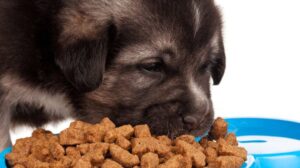
Managing Diarrhea in Dogs: Suitable Diet Options
The first thing to do when your dog is experiencing diarrhea is make sure he gets enough water. You will learn here how to gently introduce solid food to him once the symptoms have subsided.
To alleviate symptoms of acute diarrhea in dogs, the vet will recommend a 24-hour zero-calorie diet. The majority of sick animals will not eat but prefer to drink lots of water.
Fill up the water bowl of your dog several times per day with fresh water and ensure that he drinks well. Add a little meat broth and a second water bowl to the first.
Your vet may also prescribe electrolyte powder or probiotic solution for your dog. You can dissolve electrolyte powder and probiotic solution in water to give to your dog. Infusions are required if the animal is too young or has lost a lot of fluid. This usually means a visit to the vet clinic.
See the guide below for more information on how to treat your dog’s acute diarrhea.
You can give your dog a mild diet if the diarrhea has improved after a few days. You can purchase Schonkost in pet stores, or make it yourself. Lean meat can be used to slowly introduce solid food to dogs with diarrhea. Many veterinarians recommend that the meat be cooked to remove fat and add no additives. For gentle dog food, chicken, beef and sheep are all excellent options.
Most sick pets can also benefit from rice. Mix the low-fat cottage or cottage cheese with cooked rice that has not been salted. This is a good time to use bagged cooked rice. You can give your dog unseasoned, homemade mashed potatoes to add some variety to his bland diet. You can also give your dog cooked pumpkin or carrots, which are easy to digest. They’re good for dogs with diarrhea.
Give your dog small amounts of food, especially at first, and distribute them throughout the day. First, he must get used to eating. You can add normal food to his diet if he improves.
What is the best dog food for chronic diarrhea?
If you have a dog with chronic diarrhea, you must determine its cause. If your dog’s diarrhea does not subside after following the above steps and a gentle diet, you should take him to the veterinarian for a checkup. A vet visit is also necessary if diarrhea continues to occur. If your dog’s diarrhea is persistent, it may be due to a food intolerance or allergy.
In this situation, your dog must be fed exceptional food on a permanent basis. It is essential that your dog eats high-quality fats and proteins. To prevent symptoms of deficiency, you may need to take dietary supplements that contain vitamins and minerals. Chronic inflammatory bowel diseases (IBD) and pancreatic insufficiency can cause persistent diarrhea. A lifelong medication, in addition to the special food, may be required.

